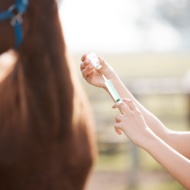Arctic tern colony sees more adults return than estimated
Over 1,000 Arctic tern chicks died of bird flu last year.
National Trust rangers are monitoring the breeding season of a colony of Arctic terns, after the species suffered an outbreak of bird flu last year.
In summer 2023, over 1,000 Arctic tern chicks and several little tern chicks died from bird flu. Despite some growth in previous seasons, these deaths threatened the future of the population.
The rangers will be monitoring the progress of Arctic terns and little terns, the second rarest seabird in the UK, at Long Nanny on the Northumberland coast.
The National Trust site is home to the largest mainland colony of Arctic terns, as they migrate from Antarctica for their breeding season. Little terns have a much shorter migration, only travelling from the west coast of Africa.
This year has seen a decreased number of breeding birds return to the site, however not as few as the rangers predicted. Over 2,000 adult terns have returned to Long Nanny, with most of these birds having laid eggs that have since hatched.
1,040 Arctic tern nests held eggs this year, compared to 1,300 in 2023.
James Porteus, an area ranger at the site, said: “We are now on tenterhooks to see how the chicks fare – and are hoping that they make it through these critical first few weeks and are able to survive the annual pressures of predation and extreme weather due to climate change.”
Meanwhile the little tern colony, which is far smaller, has also seen a decrease in the past year. The rangers recorded a minimum of 24 breeding pairs this year, compared to 37 in 2023.
Since the 1980s, the number of little tern breeding pairs in England has declined from approximately 2,000 pairs to just 1,400 today. The ranger team believes this is due to habitat loss and recreational disturbance, meaning that reserves such as Long Nanny are vital to the species’ survival.
This year rangers at Long Nanny have also confirmed the first known breeding attempt between an American black tern and an Arctic tern.
Three eggs had been successfully laid, however it is seeming unlikely that the eggs will hatch.
Chris Redfern, from Newcastle University, said: “Although the eggs appear to have been fertile, hatching is well overdue and we suspect that the species difference between Arctic and Black Terns is too wide to allow healthy, living chicks to develop.
“Terns are loyal to their partners, so despite it now looking very unlikely that these eggs will hatch, it will be interesting to see if they try again next year.”
Image © Shutterstock



 Zoetis UK has apologised for a supply shortage of Equip Artervac, caused by a manufacturing issue.
Zoetis UK has apologised for a supply shortage of Equip Artervac, caused by a manufacturing issue.